小学英语教育日记
小学生英语日记范文(十篇)
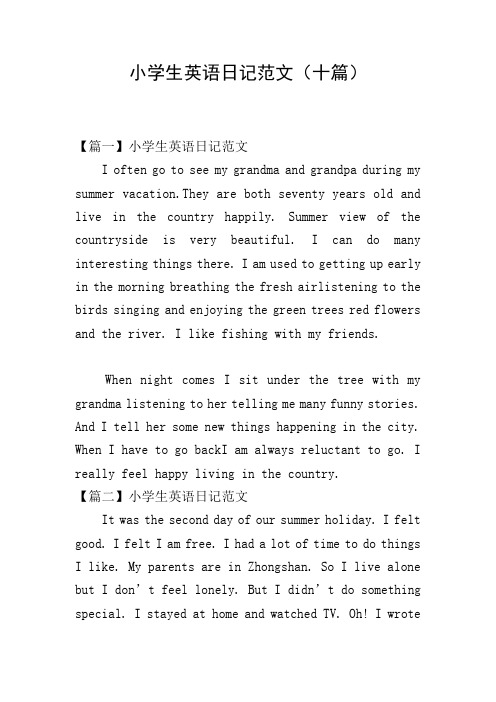
小学生英语日记范文(十篇)【篇一】小学生英语日记范文I often go to see my grandma and grandpa during my summer vacation.They are both seventy years old and live in the country happily. Summer view of the countryside is very beautiful. I can do many interesting things there. I am used to getting up early in the morning breathing the fresh airlistening to the birds singing and enjoying the green trees red flowers and the river. I like fishing with my friends.When night comes I sit under the tree with my grandma listening to her telling me many funny stories. And I tell her some new things happening in the city. When I have to go backI am always reluctant to go. I really feel happy living in the country.【篇二】小学生英语日记范文It was the second day of our summer holiday. I felt good. I felt I am free. I had a lot of time to do things I like. My parents are in Zhongshan. So I live alone but I don’t feel lonely. But I didn’t do something special. I stayed at home and watched TV. Oh! I wrotean Englishdaily composition. It was my homework. Today, I have slept for 14 hours.I thought I was very tired. It was time for dinner. I must go! I am very hungry. 【篇三】小学生英语日记范文my summer vacation of this year was very enjoyable.i went to the countryside to spend my summer holidays. it is very beautiful there. there are green plants,clear rivers, lovely animals kind people. i spent two weeks helping my grandfather do some farm work there.i wrote down what happened in my diary every day.besides that,i helped the children in the neighbourhood with their lessons. i helped them read english improve their spoken english. their parents thanked me for this.【篇四】小学生英语日记范文Though my daily life is extremely monotonous, I try hard to adapt myself to it. Why? Because I intend to be a good student. I wish to render service to my country.I get up at six o’clock every day. After I wash my face and brush my teeth, I begin to review my lessons.I go to school at seven o’clock.After school is over, I return home. We usually have supper at seven o’clock.Then I begin to do my homework.I want to finish it before I go to bed.【篇五】小学生英语日记范文Today my parents took me to my grandfather’s house.I played with my cousin. Suddenly my cousin suggested going to the park and having a rest. “that’s a good idea.” I said. Then we prepared for the traveling. After lunch, the sky turned dark. After that , it rained heavily. It meant our plan is impossible. What a pity day!Tomorrow is New Year’s Day, my family have had a completely cleaning for two days. Then my father and I decorated our flat and my mother cooked delicious food for our meal. After supper we watched TV program. How happy we were!The day after yesterday I received 200yuan from my relatives as my pocket money. I was so happy but my father and mother said that I should give a half to them and the rest would be my pocket money in one year.“what!” I shouted.【篇六】小学生英语日记范文I get up at six in the morning. Then I wash my face and brush my teeth. After a quick breakfast, I go to school in my mother’s car. It takes us more than half an hour to get there.We have four hour classes in the morning. I have luch at my grandparents’, because their home is nearer to my school.After two classes in the afternoon, school is over. Then we clean our classroom.I get home at about half past five. We have dinner at seven. After dinner I do my homework. If I finish my homesork early, I can watch TV for half an hour. I go to bed at half past nine or ten.【篇七】小学生英语日记范文The weather of today is very comfortable, though the weather forecast said it is cloudy, but just a little bit rain, very cool.The weather forecast said it is cloudy, and friendsabout to play basketball, but unfortunately, in the rain can play. Afternoon after the rain stopped to help my mother to buy food supermarket. Generally bad mood today.【篇八】小学生英语日记范文Our shool is big and nice.There are about one thousand students in our school. Every day we have four lessons in the morning and three lessons in the afternoon. Our morning lessons begin at half past eight and we finish school at four o’clock We take the same subjects at school. Such as Chinese, maths, Englsh, PE and so on.The school day is long. But we love our school life.【篇九】小学生英语日记范文It was the third day of our winter holiday. Today, there are many business in my mother’s company. So my mother told me to help my uncle who is the manager of my mother’s company. I sat in my mother’s office and help her answer the telephone. While I was free, I was writing my homework. Although I also have a lot of time to do my homework, I still do it. Because in my mother’s office, I had nothing to do. If I did nothing, I was wasting my time and my life. I can’t do the foolishthing. We should take good use of our time.【篇十】小学生英语日记范文We had a small debate yesterday in politics class, which made everybody laugh.Wang Yongbin in our class is funny. He said with a crooked neck, “please state your opinion in opposition.”It looks very serious! The opposite students grabbed the handle of our classmates, so Liu Yang, our mathematics class, said immediately: “the student said that dreams and dreams are opposite to reality.” The teacher and his classmates laughed.There was a counter student, Zhang Yijun, who said that he helped us in the opposite direction. Fortunately, the teacher reminded him in time to correct it. Yu Miao, a counter student, said, “don’t you think it’s hard to learn before the end of the semester?”So I interposed, “because we know that we have passed.”The students applauded immediately. Every time when our fellow students spoke well, Mu Deyu said at the bottom, “brilliant, really brilliant!”We said, “why don’t you go up and say it?” He said, “I’m stage fright.”This debate is reallyinteresting!。
小学英语教学日志范文30篇

小学英语教学日志范文30篇Teaching English to young learners can be a rewarding yet challenging experience. As an elementary school English teacher, I have had the opportunity to work with students of diverse backgrounds and skill levels. Over the years, I have kept detailed teaching logs to reflect on my lessons, track student progress, and plan for future instruction. In this essay, I will share 30 sample English teaching logs that highlight the successes, challenges, and insights I have gained throughout my career.Log 1: September 5thToday was the first day of the new school year, and I welcomed a class of 25 eager third-grade students. I started the lesson by introducing myself and explaining the importance of learning English. To gauge their current proficiency, I conducted a brief assessment, asking students to introduce themselves and share one thing they enjoy doing. I was pleased to see that many students were able to respond in simple English, while others showed more hesitation. I made a note to provide additional support for the struggling learners.Log 2: September 12thThis week, I focused on teaching basic greetings and classroom instructions. I began the lesson by modeling the phrases "Hello," "Good morning," and "How are you?" and had the students practice them in pairs. They seemed to enjoy the interactive activities, and I observed a noticeable improvement in their pronunciation by the end of the class. For the second half of the lesson, I introduced common classroom commands, such as "Sit down," "Stand up," and "Raise your hand." The students responded well to these instructions and were able to follow them with minimal confusion.Log 3: September 19thToday, I introduced the alphabet and its corresponding sounds. I started by singing the alphabet song with the class, then moved on to individual letter recognition. To make the lesson more engaging, I incorporated various games and activities, such as "Letter Bingo" and "Name that Letter." The students were enthusiastic and eager to participate, and I was impressed by their ability to identify and pronounce the letters correctly.Log 4: September 26thThis week, I focused on teaching basic vocabulary related to colors, shapes, and numbers. I began the lesson by holding up various objects and asking the students to identify their colors and shapes.They seemed to grasp the concepts quickly and were able to respond accurately. For the second half of the class, I introduced numbers 1 to 10 and had the students practice counting and identifying the written forms. To reinforce the learning, I assigned a worksheet for them to complete at home.Log 5: October 3rdToday, I introduced the topic of family members. I started by showing a family tree and asking the students to identify the different family members, such as mother, father, sister, and brother. They were able to recognize the vocabulary and even shared information about their own families. To make the lesson more interactive, I had the students create their own family trees and present them to the class. This activity not only helped them practice their English but also fostered a sense of community within the classroom.Log 6: October 10thThis week, I focused on teaching basic conversational skills. I began the lesson by modeling simple dialogues, such as greeting someone, asking how they are, and responding accordingly. The students then had the opportunity to practice these conversations in pairs, with me monitoring and providing feedback. I was pleased to see that they were becoming more confident in their speaking abilities and were able to engage in short exchanges with their peers.Log 7: October 17thToday, I introduced the topic of daily routines. I started by sharing my own daily routine, using simple present tense verbs to describe my activities throughout the day. The students then had the chance to share their own routines, which allowed me to assess their understanding of the vocabulary and grammar concepts. To reinforce the learning, I assigned a worksheet where the students had to draw and label the different activities in their daily lives.Log 8: October 24thThis week, I focused on teaching vocabulary related to the human body. I began the lesson by showing a diagram of the human body and asking the students to identify the different parts, such as head, eyes, nose, and ears. They were able to recognize the vocabulary and even started using the words in simple sentences. To make the lesson more engaging, I incorporated a game where the students had to touch the corresponding body part when I called it out.Log 9: October 31stToday, I introduced the topic of emotions. I started by asking the students to share how they were feeling that day, using basic emotion words like happy, sad, and angry. We then discussed different scenarios that might elicit these emotions, and the students had the opportunity to practice expressing their feelings in shortsentences. To reinforce the learning, I assigned a worksheet where the students had to draw and label the emotions they were experiencing.Log 10: November 7thThis week, I focused on teaching vocabulary related to animals. I began the lesson by showing pictures of various animals and asking the students to identify them. They were able to recognize the vocabulary and even shared additional information about the animals, such as where they live and what they eat. To make the lesson more interactive, I had the students create their own animal puppets and use them to engage in simple dialogues.Log 11: November 14thToday, I introduced the topic of clothing. I started by showing pictures of different articles of clothing and asking the students to identify them. They were able to recognize the vocabulary and even shared information about their own favorite outfits. To reinforce the learning, I had the students draw and label their own outfits, which they then presented to the class.Log 12: November 21stThis week, I focused on teaching vocabulary related to the weather. I began the lesson by discussing the current weather conditions and asking the students to share their observations. We then exploreddifferent types of weather, such as sunny, rainy, and snowy, and the students had the opportunity to practice using the vocabulary in short sentences. To make the lesson more engaging, I incorporated a weather-themed game where the students had to match the weather condition to the appropriate picture.Log 13: November 28thToday, I introduced the topic of food. I started by showing picturesof various food items and asking the students to identify them. They were able to recognize the vocabulary and even shared information about their favorite foods. To reinforce the learning, I had the students create their own "food plates" and describe the different items they had chosen.Log 14: December 5thThis week, I focused on teaching vocabulary related to transportation.I began the lesson by showing pictures of different modes of transportation, such as car, bus, and airplane, and asking the students to identify them. They were able to recognize the vocabulary and even shared information about their own experiences with different forms of transportation. To make the lesson more interactive, I had the students create their own paper airplanes and engage in a friendly competition to see whose could fly the farthest.Log 15: December 12thToday, I introduced the topic of hobbies and interests. I started by asking the students to share their favorite activities and what they enjoy doing in their free time. They were able to express their interests using simple English, and I was impressed by the variety of hobbies they mentioned, ranging from sports to arts and crafts. To reinforce the learning, I had the students create posters showcasing their hobbies and present them to the class.Log 16: December 19thThis week, I focused on teaching vocabulary related to the seasons. I began the lesson by discussing the different seasons and their characteristics, such as the weather, clothing, and outdoor activities. The students were able to recognize the vocabulary and even shared their personal experiences with the various seasons. To make the lesson more engaging, I had the students create seasonal collages using magazine clippings and other craft materials.Log 17: January 9thToday, I introduced the topic of community helpers. I started by showing pictures of different community workers, such as firefighters, police officers, and doctors, and asking the students to identify them. They were able to recognize the vocabulary and even shared information about the roles and responsibilities of these community helpers. To reinforce the learning, I had the students create their own "community helper" posters and present them to the class.Log 18: January 16thThis week, I focused on teaching vocabulary related to the classroom environment. I began the lesson by showing various classroom objects, such as pencils, books, and desks, and asking the students to identify them. They were able to recognize the vocabulary and even started using the words in simple sentences. To make the lesson more interactive, I had the students go on a "classroom scavenger hunt," where they had to find and identify specific items in the classroom.Log 19: January 23rdToday, I introduced the topic of sports and outdoor activities. I started by showing pictures of different sports and asking the students to identify them. They were able to recognize the vocabulary and even shared information about their own favorite sports and activities. To reinforce the learning, I had the students create their own "sports cards," which included the name, a picture, and a brief description of the sport.Log 20: January 30thThis week, I focused on teaching vocabulary related to the home environment. I began the lesson by showing pictures of different rooms and household items, and asking the students to identify them. They were able to recognize the vocabulary and even startedusing the words in simple sentences. To make the lesson more engaging, I had the students create their own "dream house" drawings and describe the different rooms and features.Log 21: February 6thToday, I introduced the topic of fruits and vegetables. I started by showing pictures of various produce items and asking the students to identify them. They were able to recognize the vocabulary and even shared information about their favorite fruits and vegetables. To reinforce the learning, I had the students create their own "healthy plate" collages, which included a variety of fruits and vegetables.Log 22: February 13thThis week, I focused on teaching vocabulary related to the calendar and time. I began the lesson by discussing the days of the week and months of the year, and had the students practice saying and writing them. We then explored the concept of time, including hours, minutes, and the difference between AM and PM. The students were able to grasp the vocabulary and even started using it in simple sentences.Log 23: February 20thToday, I introduced the topic of holidays and celebrations. I started by discussing the major holidays celebrated in the students' homecountries and the traditions associated with them. They were able to share their own experiences and even taught me about some unfamiliar holidays. To reinforce the learning, I had the students create their own holiday greeting cards and present them to the class.Log 24: February 27thThis week, I focused on teaching vocabulary related to the five senses. I began the lesson by discussing the different senses, such as sight, sound, touch, taste, and smell, and had the students identify objects and experiences associated with each one. They were able to recognize the vocabulary and even started using it in short descriptions. To make the lesson more engaging, I had the students participate in a "mystery box" activity, where they had to identify various objects using their senses.Log 25: March 6thToday, I introduced the topic of musical instruments. I started by showing pictures of different instruments and asking the students to identify them. They were able to recognize the vocabulary and even shared information about their own musical experiences. To reinforce the learning, I had the students create their own "instrument collages" and present them to the class.Log 26: March 13thThis week, I focused on teaching vocabulary related to the human body. I began the lesson by reviewing the body parts we had covered earlier in the year and then introduced additional vocabulary, such as elbow, knee, and ankle. The students were able to recognize the new words and even started using them in simple descriptions of their own bodies. To make the lesson more interactive, I had the students play a game of "Simon Says" to practice the body part vocabulary.Log 27: March 20thToday, I introduced the topic of occupations. I started by showing pictures of different professionals, such as doctors, teachers, and firefighters, and asking the students to identify them. They were able to recognize the vocabulary and even shared information about the roles and responsibilities of these various occupations. To reinforce the learning, I had the students create their own "career posters" and present them to the class.Log 28: March 27thThis week, I focused on teaching vocabulary related to the natural world. I began the lesson by discussing the different elements of nature, such as plants, animals, and weather phenomena. The students were able to recognize the vocabulary and even started using it in short descriptions. To make the lesson more engaging, I had the students create their own "nature collages" using magazineclippings and other craft materials.Log 29: April 3rdToday, I introduced the topic of family relationships. I started by reviewing the family member vocabulary we had covered earlier in the year and then expanded on it by introducing additional terms, such as aunt, uncle, and cousin. The students were able to recognize the new words and even started using them in simple sentences about their own families. To reinforce the learning, I had the students create their own "family trees" and present them to the class.Log 30: April 10thThis week, I focused on teaching vocabulary related to the school environment. I began the lesson by discussing the various areas and objects within the school, such as the cafeteria, library, and chalkboard. The students were able to recognize the vocabulary and even started using it in short descriptions of their daily school routines. To make the lesson more interactive, I had the students participate in a "school scavenger hunt," where they had to identify and locate specific items around the classroom and school.Throughout these 30 teaching logs, I have witnessed the growth and progress of my elementary school students as they have developed their English language skills. From introducing basic vocabulary and grammar concepts to engaging them in more complex conversationsand activities, I have continuously adapted my teaching strategies to meet the diverse needs of my learners. The successes and challenges documented in these logs have not only helped me reflect on my own practice but have also informed my future lesson planning and instructional approaches. As I continue on this rewarding journey of teaching English to young learners, I am committed to providing them with a solid foundation in the language and fostering their love of learning.。
小学英语教育实习周记范文4篇
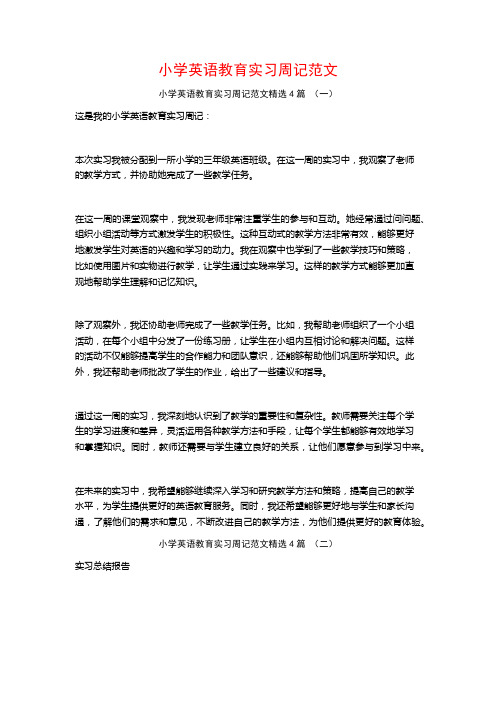
小学英语教育实习周记范文小学英语教育实习周记范文精选4篇(一)这是我的小学英语教育实习周记:本次实习我被分配到一所小学的三年级英语班级。
在这一周的实习中,我观察了老师的教学方式,并协助她完成了一些教学任务。
在这一周的课堂观察中,我发现老师非常注重学生的参与和互动。
她经常通过问问题、组织小组活动等方式激发学生的积极性。
这种互动式的教学方法非常有效,能够更好地激发学生对英语的兴趣和学习的动力。
我在观察中也学到了一些教学技巧和策略,比如使用图片和实物进行教学,让学生通过实践来学习。
这样的教学方式能够更加直观地帮助学生理解和记忆知识。
除了观察外,我还协助老师完成了一些教学任务。
比如,我帮助老师组织了一个小组活动,在每个小组中分发了一份练习册,让学生在小组内互相讨论和解决问题。
这样的活动不仅能够提高学生的合作能力和团队意识,还能够帮助他们巩固所学知识。
此外,我还帮助老师批改了学生的作业,给出了一些建议和指导。
通过这一周的实习,我深刻地认识到了教学的重要性和复杂性。
教师需要关注每个学生的学习进度和差异,灵活运用各种教学方法和手段,让每个学生都能够有效地学习和掌握知识。
同时,教师还需要与学生建立良好的关系,让他们愿意参与到学习中来。
在未来的实习中,我希望能够继续深入学习和研究教学方法和策略,提高自己的教学水平,为学生提供更好的英语教育服务。
同时,我还希望能够更好地与学生和家长沟通,了解他们的需求和意见,不断改进自己的教学方法,为他们提供更好的教育体验。
小学英语教育实习周记范文精选4篇(二)实习总结报告在本学期的小学英语教育实习中,我有幸接触到了小学生英语教育的各个方面,并且获得了很多宝贵的经验和教训。
通过这次实习,我对小学英语教育的理论知识和实践操作有了更深入的了解,也提高了自己的教学能力和专业素养。
首先,在实习过程中,我深刻领悟到了小学英语教育需要注重培养学生的语言能力和交际能力。
为了能更好地帮助学生理解和掌握英语知识,我采用了多种教学方法,如游戏化教学、情景教学和竞赛教学等。
小学英语教学日记【精选】
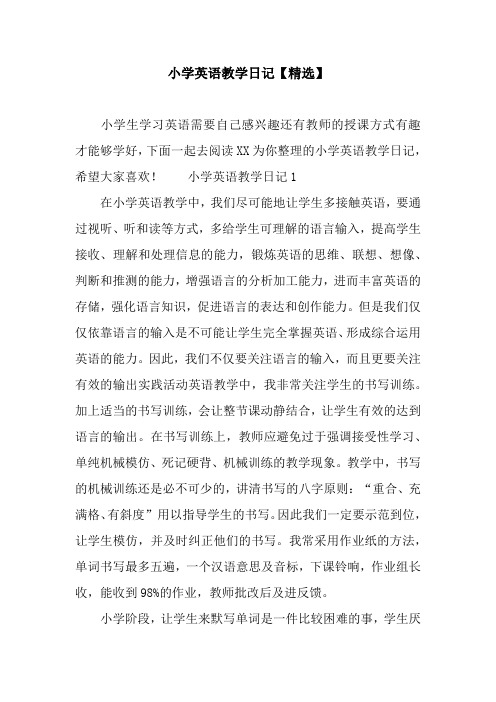
小学英语教学日记【精选】小学生学习英语需要自己感兴趣还有教师的授课方式有趣才能够学好,下面一起去阅读XX为你整理的小学英语教学日记,希望大家喜欢!小学英语教学日记1在小学英语教学中,我们尽可能地让学生多接触英语,要通过视听、听和读等方式,多给学生可理解的语言输入,提高学生接收、理解和处理信息的能力,锻炼英语的思维、联想、想像、判断和推测的能力,增强语言的分析加工能力,进而丰富英语的存储,强化语言知识,促进语言的表达和创作能力。
但是我们仅仅依靠语言的输入是不可能让学生完全掌握英语、形成综合运用英语的能力。
因此,我们不仅要关注语言的输入,而且更要关注有效的输出实践活动英语教学中,我非常关注学生的书写训练。
加上适当的书写训练,会让整节课动静结合,让学生有效的达到语言的输出。
在书写训练上,教师应避免过于强调接受性学习、单纯机械模仿、死记硬背、机械训练的教学现象。
教学中,书写的机械训练还是必不可少的,讲清书写的八字原则:“重合、充满格、有斜度”用以指导学生的书写。
因此我们一定要示范到位,让学生模仿,并及时纠正他们的书写。
我常采用作业纸的方法,单词书写最多五遍,一个汉语意思及音标,下课铃响,作业组长收,能收到98%的作业,教师批改后及进反馈。
小学阶段,让学生来默写单词是一件比较困难的事,学生厌倦,出错率高,影响了学生学习英语的积极性。
因此我在教学中让学生听写及默写的次数远远少于抄写。
抄写不能局限在简单的机械抄写,教师要变换方法,激发学生的书写兴趣。
我常让学生自己归类单词并利用小笔记来积累归类好的单词;让学生可以翻开书找要求写的某些单词,比速度,训练学生的单词记忆,并可以增加学生看单词表的次数。
单词的学习离不开拼写,一味的抄写又显得枯燥,因此我们可以让学生手、口、脑并用,联系课堂内容进行自由创作学习科目单词和日常生活安排后,可以设计一个新颖的课程表及作息时间表,外观可大胆设计,充分发挥想像力,可展示也可自用;如遇到节日等,指导学生制作贺卡,提供英语的节日祝语,让学生表达自己的祝福。
小学六年级英语教学日志随笔
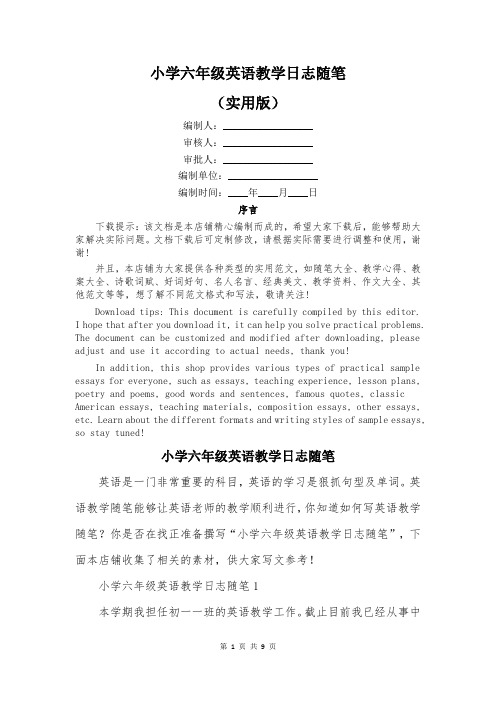
小学六年级英语教学日志随笔(实用版)编制人:__________________审核人:__________________审批人:__________________编制单位:__________________编制时间:____年____月____日序言下载提示:该文档是本店铺精心编制而成的,希望大家下载后,能够帮助大家解决实际问题。
文档下载后可定制修改,请根据实际需要进行调整和使用,谢谢!并且,本店铺为大家提供各种类型的实用范文,如随笔大全、教学心得、教案大全、诗歌词赋、好词好句、名人名言、经典美文、教学资料、作文大全、其他范文等等,想了解不同范文格式和写法,敬请关注!Download tips: This document is carefully compiled by this editor.I hope that after you download it, it can help you solve practical problems. The document can be customized and modified after downloading, please adjust and use it according to actual needs, thank you!In addition, this shop provides various types of practical sample essays for everyone, such as essays, teaching experience, lesson plans, poetry and poems, good words and sentences, famous quotes, classic American essays, teaching materials, composition essays, other essays, etc. Learn about the different formats and writing styles of sample essays, so stay tuned!小学六年级英语教学日志随笔英语是一门非常重要的科目,英语的学习是狠抓句型及单词。
小学生英语日记范文(6篇)
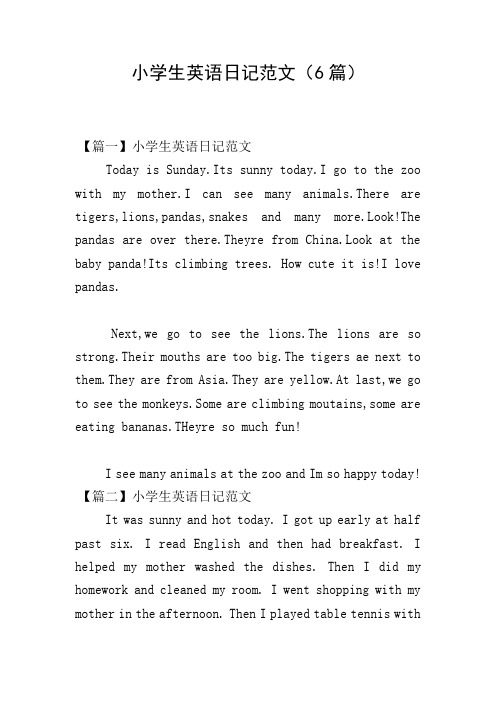
小学生英语日记范文(6篇)【篇一】小学生英语日记范文Today is Sunday.Its sunny today.I go to the zoo with my mother.I can see many animals.There are tigers,lions,pandas,snakes and many more.Look!The pandas are over there.Theyre from China.Look at the baby panda!Its climbing trees. How cute it is!I love pandas.Next,we go to see the lions.The lions are so strong.Their mouths are too big.The tigers ae next to them.They are from Asia.They are yellow.At last,we go to see the monkeys.Some are climbing moutains,some are eating bananas.THeyre so much fun!I see many animals at the zoo and Im so happy today! 【篇二】小学生英语日记范文It was sunny and hot today. I got up early at half past six. I read English and then had breakfast. I helped my mother washed the dishes. Then I did my homework and cleaned my room. I went shopping with my mother in the afternoon. Then I played table tennis withmy friends. In the evening I watched TV and read a book.I really had a busy and interesting day.【篇三】小学生英语日记范文It was a hot day during my summer holidays in 20xx. My mother and I got on the bus which would take us to the village where my grandma lived. It was so hot that I felt very thirsty. Then I began to think of the sweet big watermelons and other fruits in Grandma’s house.I could hardly wait to arrive there and see my grandma.It took us one more hour to get there. When we walked into the house, Grandma was busy preparing lunch in the kitchen. It seemed that she was very glad to see us, which I knew from the big smile on her wrinkled face. She brought out a big watermelon and cut it. It was so nice to eat the watermelon on such a hot day.【篇四】小学生英语日记范文I had a great time on my vacation.To begin with,i finished my homework.it was took me ten days.then,i came back my old home with my family.we visted my grandparents ,my uncle and my aunt.they were friendly and kind.luckyly,they gave mesome money,i was very happy.On small year day,my dad took me to skate.that was very fanny.i fell all the time.it was a little ache,but i still skated.On new year’s day,we ate at my uncle’s home.my aunt cooked a lot of meels.they were deliious,too,so i ate very fell.【篇五】小学生英语日记范文Yesterday was Saturday. I got up at 7:00.Yesterday morning,I played badminton with my friends.And had a picinc this afternoon.Do you know we ate? We ate eggs,chicken,fish,pork,mutton and fruit. We found a lof of different birds on the forest.We took some photo with many birds .We were very happy. Yesterday evening,we watched TV,cleaned the room and swept floor.Today is Sanday.This morning,I climbed hill at 5:00with my family.We ate some tasty food on the top of the hill. This afternoon. We went to the park. Some people flied kites.Some people catched butterflys and some people swimmed in the lake.Some old people playedchess under the trees. A lady read books on the bench and looked after her baby.Two girls drawed on the dench. What a beautiful!Now is evening. Just,Igot a haircut and shopped for clothes.Oh,now is 10:00.I am going to sleep.What a happy weekend!【篇六】小学生英语日记范文Today, I was walking home from school and saw my neighbor’s grandfather planting garlic on the ground.I asked grandpa curiously, “can garlic be planted in the field?”Grandpa replied with a grin: “of course, garlic can also be planted in the soil, next year will receive more!”I saw grandpa planting garlic row by row in the soil evenly.On the second day, I couldn’t wait to go to my grandfather’s garlic place and look at it, and there was no movement. So I poured some water on the garlic, hoping that they would grow up quickly.On the morning of the third morning, I came to mygrandfather’s garlic growing place and found that garlic had sprout a little bit of sprout.On the sixth day, all the garlic came out of the soil, and the green garlic leaves were arranged neatly as if they were the fastest.Now the garlic planted by grandpa has already sent five garlic leaves. I admire Grandpa, grandpa is really a vegetable expert.。
小学三年级英语教学叙事随笔5篇
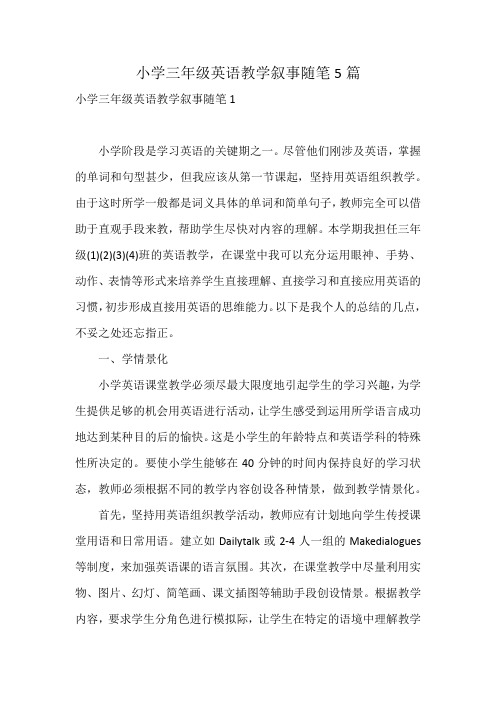
小学三年级英语教学叙事随笔5篇小学三年级英语教学叙事随笔1小学阶段是学习英语的关键期之一。
尽管他们刚涉及英语,掌握的单词和句型甚少,但我应该从第一节课起,坚持用英语组织教学。
由于这时所学一般都是词义具体的单词和简单句子,教师完全可以借助于直观手段来教,帮助学生尽快对内容的理解。
本学期我担任三年级(1)(2)(3)(4)班的英语教学,在课堂中我可以充分运用眼神、手势、动作、表情等形式来培养学生直接理解、直接学习和直接应用英语的习惯,初步形成直接用英语的思维能力。
以下是我个人的总结的几点,不妥之处还忘指正。
一、学情景化小学英语课堂教学必须尽最大限度地引起学生的学习兴趣,为学生提供足够的机会用英语进行活动,让学生感受到运用所学语言成功地达到某种目的后的愉快。
这是小学生的年龄特点和英语学科的特殊性所决定的。
要使小学生能够在40分钟的时间内保持良好的学习状态,教师必须根据不同的教学内容创设各种情景,做到教学情景化。
首先,坚持用英语组织教学活动,教师应有计划地向学生传授课堂用语和日常用语。
建立如Dailytalk或2-4人一组的Makedialogues 等制度,来加强英语课的语言氛围。
其次,在课堂教学中尽量利用实物、图片、幻灯、简笔画、课文插图等辅助手段创设情景。
根据教学内容,要求学生分角色进行模拟际,让学生在特定的语境中理解教学内容。
再次,通过游戏活动来表现情景。
游戏活动能使抽象语言内容变成一种具体、形象的情景,具有直观性、趣味性和竞争性等特点,能有效地激发他们学习的积极性。
二、重视学生的主体地位,发扬教学民主,创设和谐气氛,增强学生的参与意识,让学生在课堂中“活”起来。
A、诱发学习动机、激发学习兴趣。
学生的学习活动总是由一定的学习动机引起的,只有当学生喜欢学、要求学,有迫切的学习愿望时,才能自觉积极地投入到学习活动中去。
那么,学生的这种学习动机从何而来呢?这就要靠教师的教学艺术,要靠教师组织富有成效的学习活动去诱发学习动机、激发学习兴趣、活跃学生思维,如设置悬念、创设情景等,将学生置于“心求通而未达,口欲言而不能”的心理状态。
英文教育随笔小学5篇
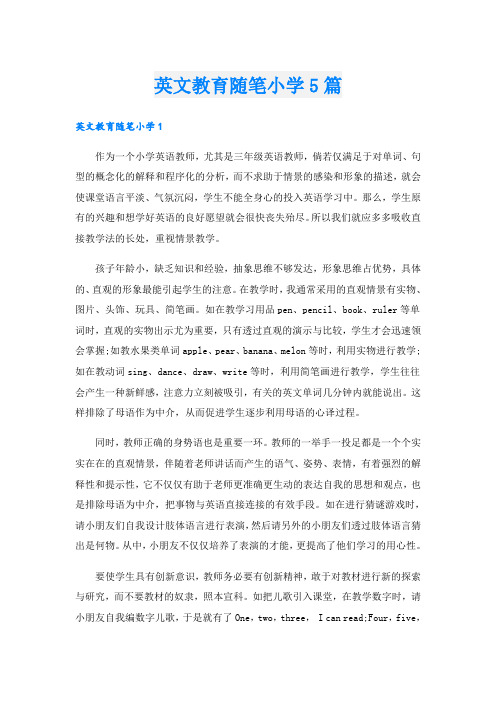
英文教育随笔小学5篇英文教育随笔小学1作为一个小学英语教师,尤其是三年级英语教师,倘若仅满足于对单词、句型的概念化的解释和程序化的分析,而不求助于情景的感染和形象的描述,就会使课堂语言平淡、气氛沉闷,学生不能全身心的投入英语学习中。
那么,学生原有的兴趣和想学好英语的良好愿望就会很快丧失殆尽。
所以我们就应多多吸收直接教学法的长处,重视情景教学。
孩子年龄小,缺乏知识和经验,抽象思维不够发达,形象思维占优势,具体的、直观的形象最能引起学生的注意。
在教学时,我通常采用的直观情景有实物、图片、头饰、玩具、简笔画。
如在教学习用品pen、pencil、book、ruler等单词时,直观的实物出示尤为重要,只有透过直观的演示与比较,学生才会迅速领会掌握;如教水果类单词apple、pear、banana、melon等时,利用实物进行教学;如在教动词sing、dance、draw、write等时,利用简笔画进行教学,学生往往会产生一种新鲜感,注意力立刻被吸引,有关的英文单词几分钟内就能说出。
这样排除了母语作为中介,从而促进学生逐步利用母语的心译过程。
同时,教师正确的身势语也是重要一环。
教师的一举手一投足都是一个个实实在在的直观情景,伴随着老师讲话而产生的语气、姿势、表情,有着强烈的解释性和提示性,它不仅仅有助于老师更准确更生动的表达自我的思想和观点,也是排除母语为中介,把事物与英语直接连接的有效手段。
如在进行猜谜游戏时,请小朋友们自我设计肢体语言进行表演,然后请另外的小朋友们透过肢体语言猜出是何物。
从中,小朋友不仅仅培养了表演的才能,更提高了他们学习的用心性。
要使学生具有创新意识,教师务必要有创新精神,敢于对教材进行新的探索与研究,而不要教材的奴隶,照本宣科。
如把儿歌引入课堂,在教学数字时,请小朋友自我编数字儿歌,于是就有了One,two,three, I can read;Four,five,six, I can write; Seven,eight,nine, I can jump; Ten,leven,twelve,I can draw.这样一来,班里的“英语小博士”越来越多,学习兴趣大大增强。
- 1、下载文档前请自行甄别文档内容的完整性,平台不提供额外的编辑、内容补充、找答案等附加服务。
- 2、"仅部分预览"的文档,不可在线预览部分如存在完整性等问题,可反馈申请退款(可完整预览的文档不适用该条件!)。
- 3、如文档侵犯您的权益,请联系客服反馈,我们会尽快为您处理(人工客服工作时间:9:00-18:30)。
小学英语教育日记
在小学英语课堂教学中,教师要将语言作为交流和描述的工具,把英语教学与各学科有机的整合,才能培养学生的综合能力。
在教学中要不断改革教学方法,引起学生学习的兴趣,是教学的关键之所在。
一、改革教法,培养互动式的课堂教学
课堂教学中,要将听说教学放在前面,多用英语组织课堂教学以增强学生的听说能力,而且坚持反复运用,逐步的坚持让学生讲英语,为学好外语创造良好的学习氛围,提高学生学习英语的兴趣。
另外,在课堂教学中,是学生养成交流、合作、展示等互动式的教学形式,给学生更多的参与教学的机会。
多采用外部手段来强化学生的动机。
比如:口头表扬、学生激励、奖励小红花等。
使学生体验到英语学习的乐趣,感觉到自己的成功。
同时,互动教学也改变了传统的教学方法,学生成为学习的主人,教师不再是专业知识的提供者,学习过程体现师生之间,学生之间的活动。
改变了只注重语音、单词的教学,而更多的是同学生交流,使教学更加活跃。
二、激情引趣,指导学法
兴趣是每个小学生的心理需要,培养教育学生的学习兴趣,在小学生英语课堂教学中尤为重要。
小学生刚刚接触英语,会感到很新奇有趣,爱英语可能会超过其他学科。
因此,教师要因势利导,激发学生的求知欲,正面引导,不能使孩子们失去学习英语的兴趣,在英语课堂教学中,游戏是展示学生的机会,英语学习中的游戏可以帮助学
生巩固词汇,句型练习和培养学生的听说读写能力,但游戏毕竟是游戏,是为教学服务的,要选择好时机,选择得当,要体现面向全体的原则。
比如,在教学pen,pencil,ruler,book,bag等文具的单词是,请一个学生到前面,把文具装入盒内,并把眼睛蒙上,教师拿出其中的一种文具问:what is this?学生答:It is a….如猜对,全体同学会说yes,如不对,全体同学说no,这样使全体学生都得到了锻炼,增强了他们学习的信心。
小学生的上课注意力集中的时间不超过20分钟,如果课中把游戏穿插于其中,不仅能分散难点,降低难度,达到事半功倍的效果,而且还能活跃课堂气氛,是学生以更大的热情投入到新内容的学习中。
比如:在学习有关人体头部各器官时,首先把学生分组,每组的几个同学到前面,教师喊口令,学生做相应的动作,做错者出局,比一比最后哪一组能获胜,这样既能使学生记住了各器官的名称,又使课堂学习显得生动活泼,通过探索尝试,全体学生的学习兴趣和热情提高了,学生自由学习,收获很大。
